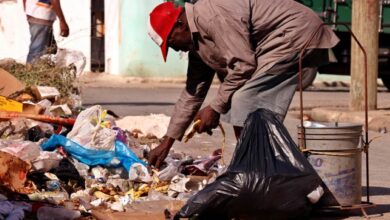What happens with Haitian immigration in Chile?
Listen this article
From negligence in hospitals to very low working conditions, Haitian immigration in Chile faces several problems

Haitian immigration in Chile has been one of the largest concerns at the state level since its increase in recent years, especially since 2015. According to El País, only in 2017, 73098 Haitians entered Chile, whose difference to 1649 of 2014 is exponential. The great increase in the immigration of the Caribbean country has not only been a challenge at the institutional level, but has also made visible the stigmas that Haitians face.
Leer en español: ¿Qué pasa con la inmigración haitiana en Chile?
On May 16, in Santiago, Chile, the Haitian doctor Rebeka Pierre died in the public transport system after the hospital Felix Bulnes discharged without having made the relevant examinations. As reported by La Tercera, as revealed by the autopsy, Pierre died from a pulmonary thromboembolism and a deep vein thrombosis of a lower limb, among others, that could have been traced and prevented in the hospital.
The case of Pierre is added to the list of Haitians who die because of the lack of medical attention, due to the lack of social guarantees and, in many cases, of migratory regularization. For example, as El País recalls, there is the case of Benito Lalane, who died of hypothermia in his precarious house in the winter of 2017, or of Joane Florvil, who died in a hospital in Santiago, after she was unjustly accused "of having left her daughter for two months, so she was arrested. "
Regarding the voices of denunciation, some human rights organizations prostrated themselves in front of the hospital to demand clarity in the case and to warn about the negligence in health with immigrants, according to RFI. Another voice was the open letter from Dr. Enrique Paris Mantilla, who wrote in El Mostrador that "The most unfortunate thing about this maternal death is the lack of signs of concern and support from the Public Health System. There is a coldness and a total indifference to a serious situation of Health with final outcome". Thus, even if there are not many cases, hospitals are being questioned for their negligence.
However, in order to understand Pierre's case, it is necessary to understand the current migratory policies towards Haitians and the stigmas they have faced in Chilean society.
You may be interested: Haiti: massive marches against President Jovenel Moïse
Haiti: on the blacklist of Chilean immigration
Although Chilean immigration policy was very limited, since it was made in 1975 during the Pinochet dictatorship, Haitians could travel to Chile and stay as tourists for three months. This situation changed with the modifications that the Government of Sebastián Piñera established on April 9, 2018, which sought to "order the house". As El Dinamo explains, there were changes in temporary visas, specifically in terms of the possibility of working, and special visas were created for Haitians, or Consular of simple tourism and for humanitarian purposes, and for Venezuelans, or Democratic Responsibility visa .
As stated in the Minute: Immigration Reform and National Migration and Aliens Policy, published on the official website of the Chilean government, Haitians were assigned to a special immigration status . In the section entitled "Haiti", it is determined "to demand (…) the obtaining of a Consular Visa for Simple Tourism with the right to entry and stay in Chile in such quality for a period of 90 days, to every Haitian citizen wishing to enter the country for recreational, sporting or religious purposes, without the purpose of immigration, residence or the development of remunerated activities". In this way, the circulation in Chile without any visa was forbidden for any Haitian inhabitant.
A little more than a year after the immigration reform, its effect has been seen in the decrease of Haitians who immigrate to the country and in the delay of the papers of the Haitians who seek to regularize their situation. As the Diario U. de Chile states, "the entrance of Haitian citizens was reduced by 62 percent".
You may be interested: Manifestations in Haiti: terrible repercussions on the economy
Aporophobia and racism against the Haitian community
Haitian immigration in Chile has an economic reason. As affirmed by the study "Haitian migration to Santiago de Chile: origin and landing of their migratory projects" by Nicolás Rojas Pedemonte, Nassila Amode, Jorge Vásquez; from interviews conducted with Haitian immigrants, "many of the interviewees evaluate their migratory project from a markedly individualistic perspective, based on the" potential "economic achievements".
This is a consequence of the racism they face, which does not allow an inclusion to the Chilean system, which is why the Haitian ends up being justified in a profit. Therefore, they "are silent about experiences of racism and discrimination, generally without appealing to a true" inclusion "in Chilean society, as subjects of law, indirectly assuming themselves as simple economic agents or" credit subjects "
Considering the above, the Haitian immigrant faces two problems mainly: aporophobia and racism. Regarding the former, the term aporophobia refers to "rejection, aversion, fear and contempt towards the poor and poverty", according to the RAE. In Chile, this attitude is common and even more so against Haitian immigrants.
As the Diario U. de Chile explains, Haiti is one of the countries with the highest stigmatization at the poverty level : "With a GDP per capita of $ 1870, Haiti is installed as the poorest country in all of Latin America". This causes not only that the population repels them, but that there is a stigma "that has condemned the natives of the island to the non-recognition of their university degrees and the lack of consideration of them for professional tasks." In that sense, although the immigrant Haitian is qualified, he is not considered for the jobs he can carry out.
To this is added the racism of Chilean society, which manifests itself through microviolence as racist comments or jokes. As the study mentioned above affirms, "this racism is generally expressed in a subtle way and the migrants themselves, far from recognizing it, tend to naturalize it or simply refer to differential treatment that, they explain, does not affect the fulfillment of their objectives in Chile" .
In this way, the Haitian immigrant lets go of the violence of this attitude and only perceives it as a difficulty to reach his economic objective. It should also be added that, because of racism, the linguistic barrier grows even more. As Professor Maria Emilia Tijoux explains, "The first barrier that Haitians have in Chile is not the language, it is the skin color. From the color of skin, the tongue also becomes a barrier, but it is not the first. The color Chileans appreciate it negatively and then they link it to the language. "
Ultimately, the case of Pierre referred to the beginning is a consequence of these attitudes towards the Haitian population. In turn, these are justified with the migration policy adopted by the government, which limits their entry into the country and causes the increase of illegal immigrants. The Haitians, then, not only face the difficulty of living in a country with climate and different codes, but the stigmas of a society that can not see beyond its color or its supposed poverty.
LatinAmerican Post | Juan Gabriel Bocanegra
Translated from "¿Qué pasa con la inmigración haitiana en Chile?"





